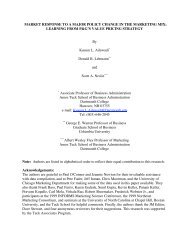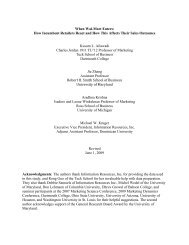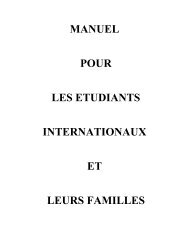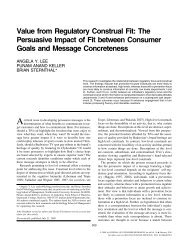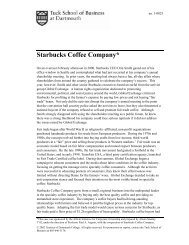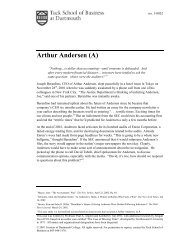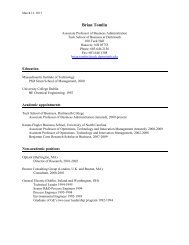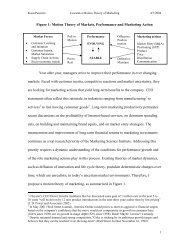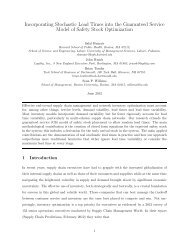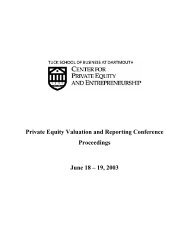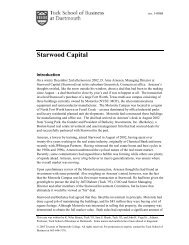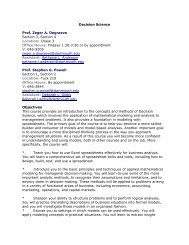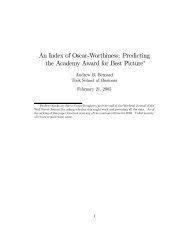tax notes international - Tuck School of Business - Dartmouth College
tax notes international - Tuck School of Business - Dartmouth College
tax notes international - Tuck School of Business - Dartmouth College
You also want an ePaper? Increase the reach of your titles
YUMPU automatically turns print PDFs into web optimized ePapers that Google loves.
JAPAN<br />
insistence that the bill include a hard and fast commitment<br />
to raise the consumption <strong>tax</strong> in fiscal 2011, and<br />
those who supported Aso’s position. The clause also<br />
stresses the need for Tokyo to promote administrative<br />
reform and to deal with wasteful expenditures — important<br />
points for many LDP members who opposed<br />
the initial 2011-specific wording. With an election<br />
looming later this year, Aso reportedly wants to avoid<br />
creating tension within his party.<br />
The LDP needs to receive a two-thirds majority in<br />
the powerful lower house <strong>of</strong> the Diet to have any<br />
hopes <strong>of</strong> passing budget-related bills that may be rejected<br />
by the opposition Democratic Party <strong>of</strong> Japan<br />
(DPJ), the majority party in the upper house.<br />
The revised clause states that the actual date for increasing<br />
the <strong>tax</strong> rate will be specified in a separate bill,<br />
but that all necessary legal preparations will be put in<br />
place by fiscal 2011, which would enable the government<br />
to implement the <strong>tax</strong> increase and other related<br />
<strong>tax</strong> reforms as soon as a date is agreed upon.<br />
By revising the supplementary clause the Cabinet<br />
has aligned itself with the LDP’s Treasury and Finance<br />
Division and its Policy Deliberation Committee, both<br />
<strong>of</strong> which reportedly gave their approval a day earlier.<br />
The party’s General Council also signaled its backing<br />
<strong>of</strong> the implementation legislation, including the supplementary<br />
clause, on January 23. The 2009 budget proposal<br />
was presented to the Diet on January 19.<br />
Some LDP lawmakers continue to harbor concerns.<br />
‘‘The wording is still ambiguous. Prime Minister Aso<br />
has a responsibility to give a full account <strong>of</strong> the plan,’’<br />
said Kenichi Mizuno, an LDP member <strong>of</strong> the House<br />
<strong>of</strong> Representatives (lower house), according to a January<br />
22 Kyodo News report.<br />
‘‘I find it acceptable if the government would<br />
specify the rate increase and the specific date in separate<br />
legislation,’’ added Ichita Yamamoto, an LDP<br />
member <strong>of</strong> the House <strong>of</strong> Councillors (upper house)<br />
who had previously opposed the clause. However,<br />
Yamamoto told reporters that ‘‘it is impossible to raise<br />
the consumption <strong>tax</strong> in fiscal 2011.’’ The Japanese fiscal<br />
year runs April 1 to March 30.<br />
Not surprisingly, the opposition DPJ was quick to<br />
condemn the consumption <strong>tax</strong> clause. At a January 23<br />
press conference in Tokyo, DPJ acting President Naoto<br />
Kan said the clause ‘‘has highlighted Prime Minister<br />
Aso’s flip-flop on another important issue.’’ Kan apparently<br />
was alluding to Aso’s indecision about whether<br />
high-income individuals should accept cash payments<br />
from Tokyo as part <strong>of</strong> the government’s overall stimulus<br />
plan. Aso initially suggested that high-income individuals<br />
should not accept any <strong>of</strong> the ¥2 trillion (about<br />
$22.5 billion) dispersal, but he reportedly changed his<br />
mind, later saying that everyone should use the money<br />
to stimulate the economy.<br />
LDP supporters defended Aso at various Tokyo<br />
press conferences on January 23. In one conference,<br />
Chief Cabinet Secretary Takeo Kawamura downplayed<br />
the possibility that LDP members will still oppose the<br />
bill when it comes up for vote in the Diet and denied<br />
that the wording indicates a retreat from Aso’s original<br />
position. ‘‘The policy presented remains the same,’’ he<br />
told reporters.<br />
Aso now hopes to build support among the Japanese<br />
public for an eventual consumption <strong>tax</strong> increase.<br />
He reportedly has assigned Akira Amati, state minister<br />
in charge <strong>of</strong> administrative reform, to draw up a plan<br />
that will address needed administrative reforms, spotlight<br />
wasteful spending, and suggest ways to make the<br />
public servant system more efficient. All <strong>of</strong> those steps<br />
are reflected in the supplementary clause as steps to be<br />
taken before resorting to a consumption <strong>tax</strong> increase.<br />
Aso’s approval rating has plummeted recently to<br />
below 20 percent, partly as a result <strong>of</strong> rising unemployment<br />
and falling wages. His decreasing popularity<br />
raises the threat <strong>of</strong> an LDP defeat in the general elections,<br />
which are to be held by September.<br />
Multinational<br />
♦ Randall Jackson, Tax Analysts.<br />
E-mail: rjackson@<strong>tax</strong>.org<br />
IASB Rejects Proposal to Allow<br />
Discounting <strong>of</strong> Current Tax in IAS 12<br />
The International Accounting Standards Board<br />
January 23 voted against a proposal included in a ballot<br />
draft <strong>of</strong> an exposure document <strong>of</strong> amendments to<br />
International Accounting Standard No. 12, ‘‘Income<br />
Taxes,’’ that would broadly allow for the discounting <strong>of</strong><br />
a company’s current <strong>tax</strong> assets and liabilities.<br />
At its board meeting in London, the IASB also decided<br />
to ‘‘stay silent’’ and not include any discussion<br />
on the discounting <strong>of</strong> current <strong>tax</strong> in the forthcoming<br />
exposure draft. The board members agreed there is no<br />
need to mention a specific requirement in IAS 12 because<br />
a company can use existing accounting literature<br />
during rare circumstances when a discount could apply<br />
because <strong>of</strong> a government agreement.<br />
IASB member James Leisenring objected to the ballot<br />
draft’s proposal, but noted that discounting <strong>of</strong> current<br />
<strong>tax</strong> can depend on circumstances, such as when<br />
there are <strong>tax</strong>es that are owed but for which a settlement<br />
can be reached with a revenue service. He added<br />
that he had no problem with a company discounting<br />
that <strong>tax</strong> amount.<br />
IASB member Robert Garnett added that in practice<br />
large accounting firms discount current <strong>tax</strong>es when<br />
there has been an agreement with a government that<br />
falls outside the normal <strong>tax</strong> code for deferred payment.<br />
400 • FEBRUARY 2, 2009 TAX NOTES INTERNATIONAL<br />
(C) Tax Analysts 2009. All rights reserved. Tax Analysts does not claim copyright in any public domain or third party content.



